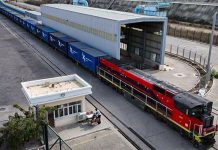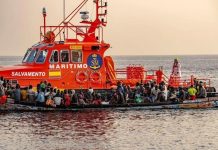Africa-Press – Angola. The then Vila Amélia, today Cidade de Cabinda, which on the 28th of May of the distant year of 1956, by Ordinance issued by the former Portuguese Colonial Administration, rose to the category of city and, from the point of view of its social growth, since then it evolved substantially, both in terms of infrastructures, services and demographics.
The city of Cabinda, also known as “Tchiowa”, which today celebrates its sixty-seventh anniversary, currently has infrastructures in the most varied domains, which, without a doubt, have completely changed its image and given its better quality of life and hope for even better days.
Cabinda has properly structured roadways, a school and health network equipped with modern infrastructure, built from scratch, including ports and airports, public and private universities, a set of housing units that emerged within the scope of the Executive’s housing development program and the greatest country’s oil industry, which constitutes its greatest “relic”.
Talking about the city of Cabinda presupposes addressing the social growth of the city, describing its people, the way of being and, above all, addressing the issues that still continue, stubbornly, to disturb the lives of citizens , namely the supply of electricity and drinking water, which, despite the occurrence of minor technical irregularities, which from time to time constrain the normal pace of supply of both products to the inhabitants, still need to be improved quantitatively and qualitatively.
Among the relevant social concerns are, with some particularity, delinquency and illegal immigration, the latter actions mostly practiced by illegal foreign citizens of the DRC and who, in search of means of survival, “took refuge” in the city of Cabinda and peripheral neighborhoods , promoting all types of acts that are not always lawful, completely disconnected from the way of life of Angolans.
Delinquency, illegal immigration, fuel trafficking, illegal use of motorcycle taxis, precarious trade on the side of roads are, among other irregularities, those that appear to be actions of a criminal nature, whether when they involve administrative transgression or criminality in its entirety. .
Proliferation of religious sects
The proliferation of religious sects in the city of Cabinda is another social phenomenon that worries city dwellers, due to the negative consequences that this reality has been causing within many families.
Most of these religious sects originate from the Democratic Republic of Congo (DRC) and are on the list of churches closed by the Angolan authorities, but which, stubbornly, their leaders, mostly Congolese from the DRC, insist on opening them and exercising religious activity . with documentation on behalf of other churches.
According to the official, in the neighborhoods, cries for help can be heard from the population, who cry out for various problems caused by religious confessions not recognized by the State, from accusations of witchcraft against minors, noise pollution resulting from “the screaming of believers in moments of worship, holding prayers in the dead of night, disturbing the peace of the neighborhood, among other irregularities.
Administrator Guilherme Pereira admitted that it is also necessary to impose order, fighting above all those “sects with principles of promoting family division, terrorism, aid to illegal immigration, among other harmful practices”.
“We have to combat these practices that are capable of causing insecurity in the province”, warned the administrator, recalling, on the other hand, that the attention of the authorities will fall mainly on these illegal churches.
booth in party
The present edition of the festivities of the City of Cabinda will be limited to carrying out a series of activities with a view to rescuing the “mystique” of the festivities of the past, which has been lost little by little, either because of Covid-19 or due to the financial crisis that devastated the world, in general, and the country in particular, informed the administrator Guilherme Pereira.
According to administrator Guilherme Pereira, this edition of the festivities in the City of Cabinda will include activities that are more identified with the population, with emphasis on football, parachuting, motocross, traditional games, friends of the trail, paragliding flight to the city and cleanup campaigns.
There are also plans, according to the announcement, for a fraternization bonfire with the participation of all residents, a fair to promote local products, dancing marathons, music-cultural sessions with an exhibition of musicians from the local, national and international scene, among other no less important actions.
“Cabinda has always been a land of celebration. And it is our desire to rescue the mystique, that festive vein of the population of the municipality of Cabinda and of the province in general, which has been lost”, said Guilherme Pereira, for whom the current moment in which hold parties in the City of Cabinda is completely different and, to this end, invites all the children of this part of the national territory and beyond, who for whatever reason have been absent from this territory, to join the festivities.
The present moment, he continued, is different and we are working precisely to show that the reality of Cabinda in the past has nothing to do with that of today, highlighting, among other valences, job opportunities, businesses and other structuring projects built in the City of Cabinda in the post-Independence period by the Angolan Executive, which make it “a good place to live”.
According to the administrator of the most populous municipality in the province, with about 87 percent of the region’s global population, the aim of the parties, this edition, is to make “all those who come to participate in them, from other latitudes, end up staying” .
“We are creating all the conditions for people to simply come to the party and end up staying”, he said, adding that this edition’s parties are an authentic invitation to return to the origins.
The administrator Guilherme Pereira appealed to the citizens to participate actively in the tasks of cleaning and embellishing the city, so that the city remains clean, as it is today, the result of a lot of work and commitment of the local authorities.
He announced that the Municipal Administration will, in the next few days, recruit young people to work in companies legally constituted in the field of solid waste collection, to also ensure the basic sanitation process using three-wheel motorcycles.
Administrator Guilherme Pereira also announced the start of rehabilitation work on open-air rainwater drainage ditches, which are already in an advanced state of degradation.
The municipality’s vision
The municipal administrator of Cabinda, Guilherme Pereira, spoke about the main challenges of the provincial headquarters and surroundings, having pointed out as the main “workhorse” the fight against illegal immigration . of efforts by the authorities of the host municipality (Cabinda) and the populations, in the sense of seeking the best results.
On the occasion of the festivities in the City of Cabinda, Guilherme Pereira said that he is familiar with all these administrative infractions and other acts of delinquency that occur in the main municipality of Cabinda and that continue to disturb the lives of the citizens, admitting that “a strategy multidisciplinary, that is, with the involvement of Defense, Security and Internal Order bodies”, to combat all these evils.
The strong man from the Administration of the Municipality of Cabinda assured that the local authorities will be relentless in taking measures to discipline and organize life in the City of Cabinda and peripheral neighborhoods.
“We are going to be strict and anyone who does not comply with the guidelines of the authorities, based on the law, will have severe measures applied”, warned administrator Guilherme Pereira, in a clear warning to all those who are involved in actions that intended to disturb public order and tranquillity.
The measures, he warned, will start at the neighborhood level, focusing on motorcycle taxi activities, carried out largely by foreign citizens with the complicity of nationals, who deliver motorbikes, at their leisure and irresponsibly, to these individuals, causing all sorts of disorder on the public road and, as if that wasn’t enough, transporting between two and three passengers on a single velocipede.
“We cannot allow our habits and customs to be distorted by people from other latitudes, who do not intend to respect the laws, values and traditions on which our life is based, on a day-to-day basis”, defended the official.
A warning was also given by the administrator Guilherme Pereira to the traditional authorities, especially the neighborhood coordinators, in the sense that they pay greater attention to illegal immigration, denouncing all citizens in this condition who settle in their areas of jurisdiction, as well as the nationals who, eventually, help the said illegality.
“We are working with the Neighborhood Commissions. We have to go back to that old phase in which the neighborhood coordinators actually knew everyone who lived in a given street”, said Guilherme Pereira, for whom this principle would facilitate the denouncement of eventual citizens residing illegally in the country.
Illegal immigration in Cabinda has reached unsustainable levels and administrator Guilherme Pereira assures that, xenophobia aside, “Cabinda and the country in general are welcoming, a very peaceful people, but we live with rules. Those who want to join us they should do it with rules and not come here to impose their own rules”, he said.
The Voice of the Citizens
Celina Mbuilo , a resident of the 1o de Maio neighbourhood, in the Luvassa Sul area, said that, despite some failures that still exist in the supply of electricity, in the distribution of drinking water and in basic sanitation, the development of the City of Cabinda, from the point of view of building economic and social infrastructures such as schools, hospitals, access roads, housing projects and others that give citizens another image and dignity.
The 25-year-old university student also pointed out, among other projects, that are having a direct impact on the lives of the inhabitants of the city and on its economic growth, some of which have already been completed and others in the construction phase, especially the Maritime Passenger Terminal recently inaugurated by the President of the Republic, João Lourenço, the Port of Águas Profundas do Caio, the Refinery, the New Cabinda International Airport (NAIC), the latter two in projection which, according to the student, when completed, will certainly provide more jobs for young people.
Celina Mbuilo asked for greater commitment from the provincial government in the implementation of actions aimed at improving access routes to the interior of the peripheral districts of the city, in the distribution of electricity and drinking water, basic sanitation and public lighting.
“The city center is doing very well in terms of basic sanitation, public lighting, road traffic, but these services need to be extended to the peripheral neighborhoods, where there are still problems with access roads, lack of public lighting and sanitation deficit. basics”, said the citizen Celina Mbuilo.
Bartolomeu Gime was born 40 years ago in the City of Cabinda. Attentive to all the phenomena around the city where his umbilical cord is buried, Bartolomeu Gime recognizes that the city has experienced substantial growth in recent times with regard to the construction of social and economic infrastructures, as well as in the demographic aspect, basic sanitation, electricity supply and potable water.
Bartolomeu Gime said that he is aware that there is still a lot to be done to make the lives of the inhabitants of the most populous municipality in the province more comfortable, but he still gives the vote of confidence to the Government for everything it has been doing in favor of of populations.
Inês Cumba , between 20 and 25 years old, a medical student at the Higher Institute of Health, said that the growth of the city of Cabinda is remarkable, pointing out in particular the projects that the Executive has developed in the energy and water sectors , which culminated, on the one hand, in the reinforcement of the levels of electricity production at the Malembo Thermal Power Station, which went from 95 megawatts to 170 megawatts, with the assembly of three more turbines of 25 megawatts each and, on the other hand, the construction of the large Water Treatment Station in the locality of Sassa-Zau, undertakings which, in the view of our interviewee, significantly improved the production and supply of both products to the population.
“Today, it is possible to notice improvements in the areas of electricity supply, drinking water and basic sanitation in our city and in the peripheral neighborhoods, and that is already very good, because it gives us a certain belief that the levels of growth tend to evolve progressively,” said the young medical student.
For More News And Analysis About Angola Follow Africa-Press






